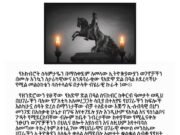Plagiarism in Abiy Ahmed’s PhD Thesis: How will Addis Ababa University handle this?
Alex de Waal, Jan Nyssen, Gebrekirstos Gebreselassie, Boud Roukema and Rundassa Eshete
Ever since Abiy Ahmed was awarded his PhD degree at the Institute of Peace and Security Studies (IPSS) at Addis Ababa University in 2017, questions have been asked about whether this was a legitimate doctorate. One of us (Rundassa) was the first to publicly call out plagiarism. Last year another of this group (de Waal) made available a copy of the thesis and raised concerns. This post revisits the question of plagiarism.
There is now sufficient evidence to demand Addis Ababa University to re-examine Abiy’s thesis; it is adequate to suspend or revoke a doctorate. In comparable cases, universities have revoked doctoral degrees on the basis of plagiarism. Addis Ababa University rescinded a Master’s thesis for plagiarism in 2019 and adopted a policy prohibiting plagiarism in 2020.
Another approach would be to suspend the award of the PhD degree pending major revision, re-submission and re-examination.
Because decision makers have a tendency to exploit their academic degrees to boost their legitimacy in the eyes of the public, dissertations have come under scrutiny. Crowd sourcing in Germany, for example (VroniPlag Wiki), led to exposure of a long list of doctoral degrees of political figures with significant levels of plagiarism. Several, including a defense minister and a minister for education and research—were stripped of their doctorates and resigned. Exposure of fraudulent degrees have forced a senior politician in South Africa out of office and caused controversy in Kenya. In Russia, the scientific anti-plagiarism group Dissernet discovered that more than 10% of State Duma members received university degrees with theses that were heavily plagiarized and possibly ghostwritten.
With the appointment of Abiy Ahmed as Prime Minister in 2018, Ethiopia has increased its reliance on PhD holders for high-level political roles. Ethiopia’s Minister of Defense, Abraham Belay, for example, proudly employs the Twitter handle @AbrahamPostDoc.
We looked at Abiy’s PhD dissertation to see if there were indications of plagiarism. The title of the thesis is “Social Capital and its Role in Traditional Conflict Resolution: The Case of Inter-religious Conflict in Jimma Zone of the Oromia Regional State in Ethiopia”, completed in 2016 and defended in 2017.
Standard plagiarism detection tools identify similarities between the text submitted and other texts available online. In a thesis largely reporting results of fieldwork, the most likely places to look for this are the theoretical and literature review sections. If a section on fieldwork findings is plagiarized, it would likely be copied from unpublished reports or student theses, which, because they are not availed online, are not detected by plagiarism detection tools.
We conducted the plagiarism check on Chapter 2, which is the literature review, filling 41 of the 150 pages of the thesis.
Annex A is the report that came back from the plagiarism software, after quotations have been cut out, showing the detected similarities. We ran it twice, independently, using different versions of Turnitin. After the exclusion, the overall similarity score is 62%. The second scan came with 64%. In both cases, the software missed (a) unpublished sources including some UN reports and (b) Wikipedia pages that have been updated since 2016, so the 62% similarity score is in reality an understatement.
Annex B is a comparison with the main identified sources. For instance, except for its first couple of lines, page 43 is fully copied from a UNDP report published in 2012, with very minor changes. For example,
“Although Ethiopia is one administrative unit, inter and intra-regional border demarcation has had economic implications pertaining to resource appropriation, mobilization and distribution”
was rewritten to:
“Although Ethiopia is one administrative unit, inter and intra-regional border demarcation has had development implications with regards to resource appropriation, mobilization and distribution” (see Annex B).
Annex C is Chapter 2 text. Readers are invited to submit this to their own plagiarism detection software to see what they can find.
Overall, there is plagiarism on every single page of Chapter 2 of Abiy Ahmed’s PhD thesis, ranging from one detected plagiarized paragraph up to entire pages. Several scholars will recognize that their writings have been very extensively copied.
A Turnitin score of 62% and occurrence of plagiarism on 41 out of 41 pages of Chapter 2 are very high figures. A PhD supervisor should not allow a thesis to go forward for examination with this score, on the reasonable expectation that a reputable university would reject it outright.
When two texts are identical or very similar, the question arises as to who is copying from whom. The date of publication is a good guide: almost always the later piece is copied from the earlier one. However, it’s important to cross-check. In principle, a writer could produce a draft and put it aside for some years, during which time it was plagiarized by someone else who publishes before the original author gets around to finalizing and publishing. In each of the cases highlighted in Annex B, this seems unlikely. There is no evidence that Abiy was writing on these topics e.g. four or fifteen years earlier and setting his writings aside, during which time those authors found his unpublished writings and copied them. Another possibility is that both an earlier author and Abiy are plagiarizing a third, yet earlier author whose work is not online. While unlikely, this would not lessen the charge of plagiarism against Abiy.
It is beyond our personal capacity to carry out a wide scrutiny of PhD theses produced at Ethiopian universities. Informal contacts with colleagues at those universities hinted that plagiarism was observable in MSc theses by Ethiopian politicians. Two of us have run checks on masters’ theses awarded by Addis Ababa University to three senior figures: Minister of Defense Abraham Belay (MSc 2007), as well as the leading figures in the Prosperity Party Takele Uma (MSc 2014) and Dagmawit Moges (MSc 2019). All three theses had high similarity scores with numerous fully copied paragraphs and sections. These occurrences alert us to the illicit but (according to our sources) prevalent trade in texts for essays at universities in Ethiopia (and elsewhere), which is based on copying text from unpublished reports, student theses, technical manuals and other gray literature. When those original documents are not online, the plagiarism cannot be detected by an online search tool; in that case experts with ‘encyclopedic’ knowledge of the literature on the topic and access to offline or paywalled research literature are needed.
Academic institutions have the obligation to revoke a degree in cases of significant falsification of data or plagiarism.
Violation of academic standards isn’t a minor misdemeanor. The academic world depends upon the bona fides of examiners and peer reviewers. If a hitherto-reputable university awards degrees for reasons other than academic excellence, its reputation and the value of its degrees is debased.
The question of the legitimacy of Abiy Ahmed’s academic credentials is first and foremost an issue of credibility for all graduates and faculty of Addis Ababa University and other Ethiopian universities.
Alex de Waal is Executive Director of the World Peace Foundation
Gebrekirstos G. Gebremeskel is founder and chief editor of Tghat.com, which is dedicated to chronicling the war on Tigray. His PhD research focuses on the application of machine learning systems and their impact on society.
Jan Nyssenis a physical geographer, and professor of geography emeritus at Ghent University.
Boud Roukema is a professor of cosmology at Nicolaus Copernicus University. He obtained his PhD in 1993 at the Australian National University.

























